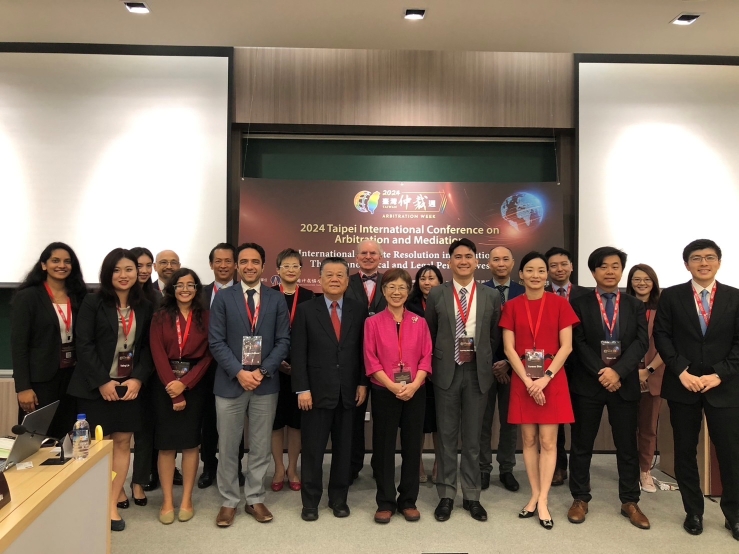
The 2024 Taipei International Conference on Arbitration and Mediation, titled “International Dispute Resolution in Evolution: The Technological and Legal Perspectives,” was held on October 29 and 30.
The conference began with opening remarks from Ms. Mei-Nu Yu, President of the Taiwan Bar Association; Dr. Yeong-Chyan Wu, Chair of the Chinese Arbitration Association, Taipei (CAA); and Dr. Yueh-Piing (Alex) Yang, Associate Professor at the National Taiwan University (NTU) College of Law and Director of the Asian Center for WTO & International Health Law and Policy (ACWH). They welcomed more than 30 scholars from 13 countries to participate in and contribute to this event. Furthermore, they all highlighted the importance of adapting to new technologies, especially the rapidly developing field of artificial intelligence.
Session I: International Dispute Resolution and Investment-Related Disputes
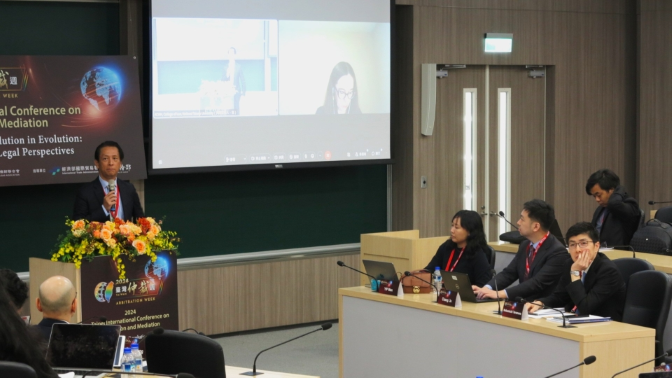
Session I focused on international dispute resolution and investment-related disputes. Moderated by Angela Yao Lin, Deputy CEO and Partner at Lee and Li, Attorneys-at-Law, the session began with Prof. Vera Korzun from the University of Akron School of Law examining how U.S. and Dutch companies potentially exploit investment treaties through corporate nationality planning by empirically analyzing ICSID arbitral awards from 2010 to 2019 to address concerns about treaty shopping and the true identity of investors. Next, Prof. Yip Man from the Singapore Management University Yong Pung How School of Law discussed strategies to mitigate the “regulatory chill” associated with climate change governance. Following her was Dr. Chang Liu from the World Bank, who presented his research to Professor Ying Xia from the University of Hong Kong. Their research explored the concept of inquisitorial arbitral tribunal by analyzing the case of Nigeria v. P&ID. Finaly, Prof. Nobumichi Teramura from the University of Brunei Darussalam Institute of Asian Studies discussed the regulatory models regarding anti-corruption and legality clauses in investment treaties concluded by East and South Asian countries. After these insightful presentations, Mr. Pijan Wu, Legal Counsel at LCS & Partners, and Mr. Anthony Yang, Managing Partner of Stellex Law Firm, led a discussion on the issues presented.
Session II: International Dispute Resolution and the Use of New Technologies
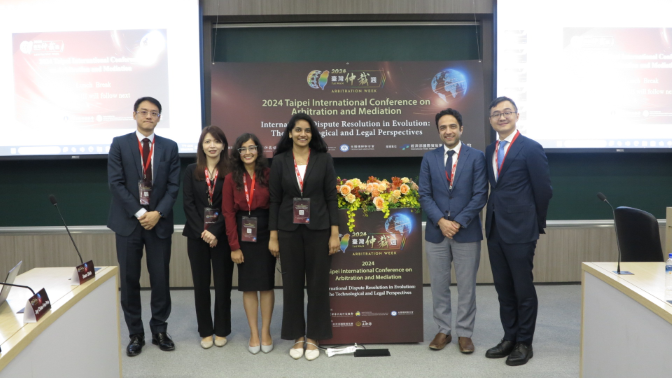
In session II moderated by Sean Shih, Partner at Baker & McKenzie (Taipei), the panelists explored the intersection of artificial intelligence (AI) and legal frameworks in dispute resolution. Prof. Farshad Ghodoosi from California State University, Northridge examined how AI is transforming the concept of legal precedent by can enable a new, macro-level approach to analyzing judicial trends and improve arbitration. Ms. Vinita Singh and Ms. Jeeri Sanjana Reddy from Damodaram Sanjivayya National Law University, India highlighted the role of soft law mechanisms in governing AI within arbitration and highlighted the need for a careful balance between innovation and regulatory safeguards. Joy Chiao Fan Pao, Attorney at Handsome Attorney-at-Law, and Jeffrey Li, Associate Partner at Lee and Li, enriched the discussions with insightful comments on the practical implications of these emerging technologies on dispute resolution.
Session III: International Dispute Resolution and Trade-Related Disputes
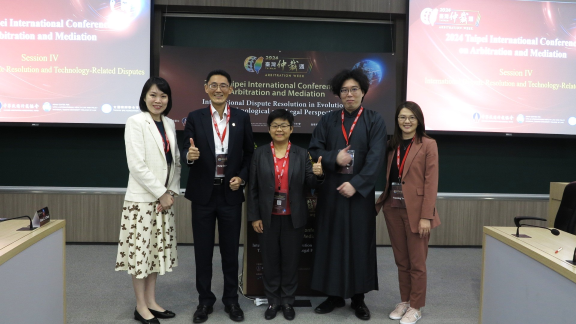
Session IV: International Dispute Resolution and Technology-Related Disputes
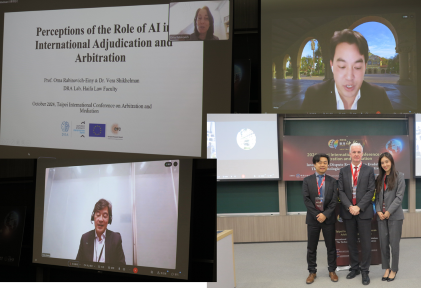
Moderated by Mr. Eton Lin from Oz & Goodwin Global Law Firm, Session IV concentrated on the opportunities and challenges that technology-related disputes present in the context of international dispute resolution. Prof. Julien Chaisse from City University of Hong Kong School of Law examined the use of arbitration in cross-border data protection and highlighted the tension between data privacy and public order. Prof. Orna Rabinovich-Einy from the University of Haifa, and Dr. Vera Shikhelman, the Research Director of the ERC research project on Dispute Resolution Automation at the University of Haifa, jointly presented their research findings on the role of AI in international adjudication and arbitration. Ms. Floriane Chang, a PhD candidate at City University of Hong Kong, examined the controversy and balance between technical efficiency and cultural considerations in the context of art dispute resolution by introducing AI. Mr. Shilin Huang, Foreign Counsel at Rajah & Tann Singapore LLP, pointed out the legal issues surrounding AI, including the lack of useful training data and potential privacy breaches. Mr. Wesley Chu, a Visiting Scholar at Stanford Law School, emphasized the need for a transparent and unbiased policy and legal environment for AI development.
Session V: New Issues in International Commercial Arbitration
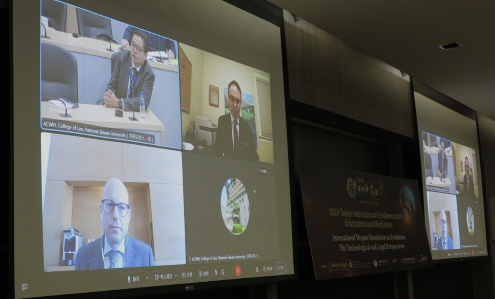
Session V was moderated by Mr. Meng-Ju Wang, partner at Formosa Transnational Attorneys at Law. This session addressed contemporary challenges in international commercial arbitration. Dean Jason Chuah from the University of Malaya Faculty of Law provided a analytical framework on determining applicable law in arbitration agreements, particularly in complex jurisdictional contexts. Mr. Nils Eliasson and Mr. Alex Lo from King & Spalding advocated for critical updates to the current UNCITRAL Model Law to enhance personal safety protections in arbitral proceedings in response to recent cases of threats and violence against arbitrators. Prof. Joshua Karton from Queen’s University Faculty of Law focused on the preliminary court reviews of arbitral decisions on jurisdiction and questioned the effectiveness of current UNCITRAL Model Law approach for addressing jurisdictional disputes, as well as proposed refinements for greater consistency. Ms. Anna L. J. Hwang, Executive Partner at Baker & McKenzie, and Ms. Pei-Ying Shang, Attorney at CLC Attorneys at Law, provided practical insights that enriched the discussion of these pressing issues.
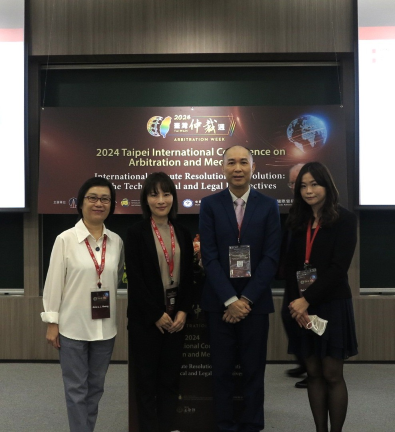
Session VI: International Dispute Resolution in East Asia
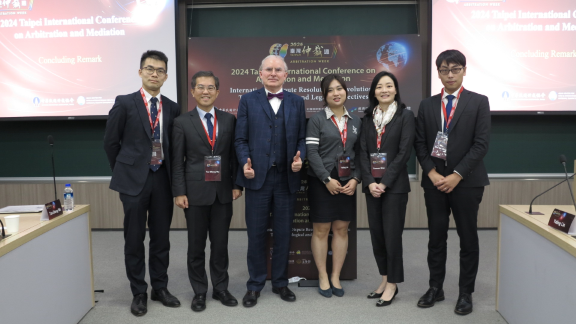
In the last session on international dispute resolution in East Asia moderated by Mr. Tzu-Sheng Wu, Principal of Justus Law Offices. First, Dr. Stephan Wilske, partner in the Gleiss Lutz, Stuttgart (Germany), discussed the influence of the UNCITRAL Model Law on national arbitration laws. He compared the arbitration laws of Germany and Taiwan, highlighting some deficiencies in Taiwan’s arbitration law. He recommended that Taiwan align future revisions with international standards, drawing on Germany’s experience rather than attempting to “reinvent the wheel.” Dr. Yunsoo Shin from South Korea evaluated the adoption of “interim measures” under the UNCITRAL Model Law and emphasized that East Asian countries should carefully design their arbitration frameworks to enhance the harmonization and competitiveness of international commercial arbitration. Lastly, Ms. Yating Lin, a Ph.D. candidate from the University of Hong Kong Faculty of Law, discussed the trend of “domestication” in international economic law with a focus on China’s approach to its international investment treaty policy reflecting an integration of its domestic law and international law.
In their concluding remarks, Mr. Tzu-Sheng Wu and Prof. Yueh-Piing (Alex) Yang summarized the academic discussions and key outcomes of the conference. They extended their appreciation to the conference organizers—the CAA, NTU ACWH, and the Taiwan Bar Association—for their contributions to the event’s success.